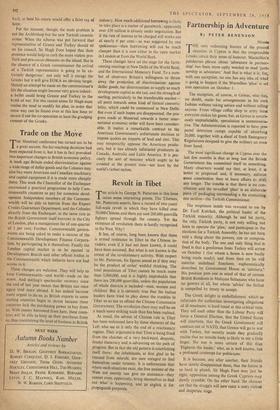Trade on the Mo've
THE Montreal conference has turned out to be a great success. No far-reaching decisions had been expected from it, but it has in fact provoked two important changes in British economic policy. A week ago Britain ended discrimination against a wide range of dollar goods and the Colonies may also buy more American and Canadian machinery and capital equipment if it is made more cheaply there. This week the Chancellor of the Exchequer announced a practical programme to help Com- monwealth countries to pay for economic devel- opment. Independent members of the Common- wealth will be able to borrow from the Export Credits Guarantees Department, and the Colonies directly from the Exchequer, at the same rate as the British Government itself borrows in the City of London, plus a management fee of one-quarter of I per cent. Further, Commonwealth govern- ments are being asked to make a success of the Commonwealth Development Finance Corpora- tion, by participating in it themselves. Finally the London capital market is to be opened to Development Boards and other official bodies in the Commonwealth which hitherto have not had access to it.
These changes are welcome. They will help to keep Commonwealth—and world—trade on the move. And sterling's spectacular recovery since the end of last year means that Britain can once again lend more abroad. It has indeed become more urgent to do so, as British exports to some sterling countries begin to shrink because these countries lack the purchasing power to buy from us. With money borrowed from here, these coun- tries will be able to keep up their purchases from us, thus maintaining the level of business in British industry. How much additional borrowing is likely to take place is a matter of guesswork; apparently over £50 million is already under negotiation. But if the rate of interest to be charged still works out at nearly 6 per cent.—as was suggested by one spokesman—then borrowing will not be much cheaper than it is now either in the open market in London or from the World Bank.
These changes have set the stage for the forth- coming meetings in New Delhi of the World Bank, and the International Monetary Fund. To a num- ber of observers Britain's willingness to throw away the protection of discrimination against dollar goods, her determination to supply as much development capital as she can, and the strength of sterling, particularly in the transferable market— all point towards some kind of formal converti- bility, which could be announced in New Delhi. But even if such hopes are disappointed, the pro- gress made at Montreal towards a better inter- national economic order will have been consider- able. It makes a remarkable contrast to the American Government's unfortunate decision to impose quotas on imports of lead and zinc. This may temporarily appease the American produ- cers, but it has already infuriated producers in Canada, Australia and Latin America. It is pre- cisely the sort of measure which ought to be avoided at the present time—not least by the world's richest nation.


































 Previous page
Previous page